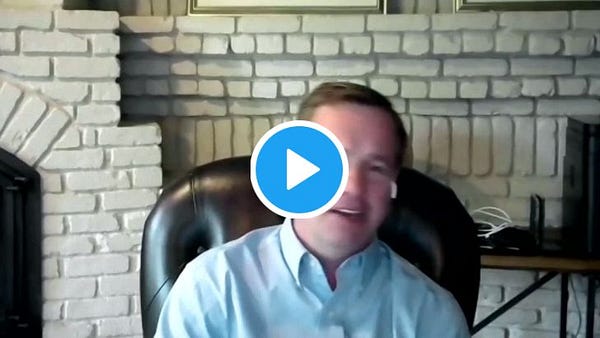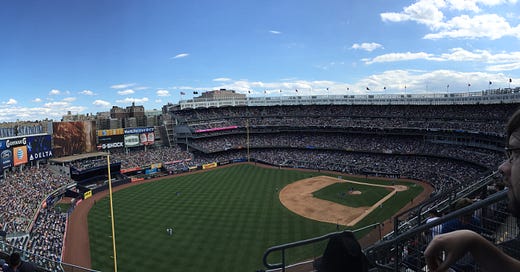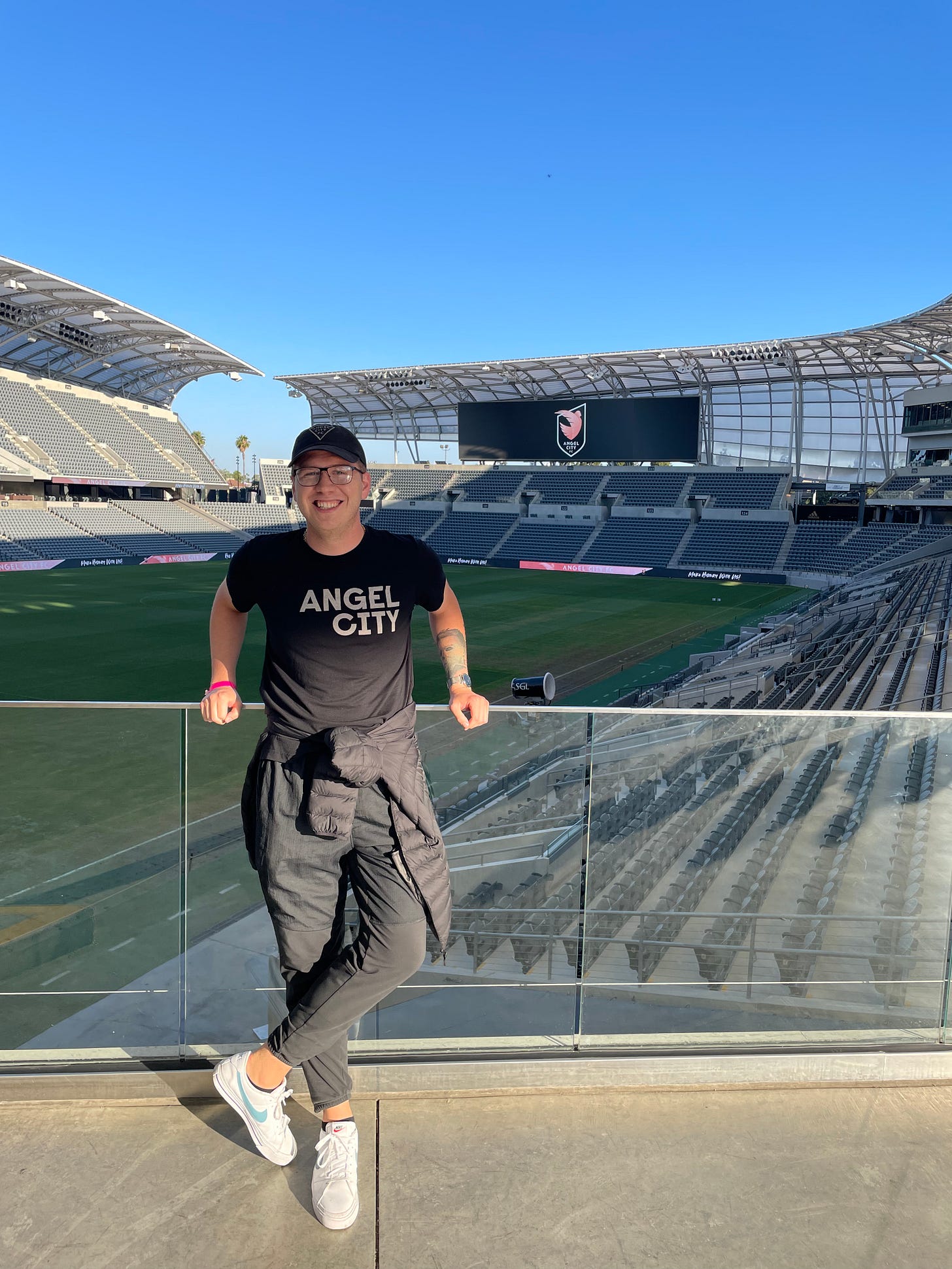Hannah Keyser dishes on Major League Baseball's sticky situation
The host of Yahoo! Sports' The Bandwagon joins us for a little baseball chat.
There is something magical about turning up to a stadium with 20,000 strangers, bonded with a common purpose. I don’t get much of that in Southern California, having moved to the area too late to form new connections with teams I grew up hating (sports are also kind of dumb, it turns out). As I’ve gotten older, I’ve looked for connections more local than San Francisco, Reading and … well, you get the idea.
Something community-owned and, frankly, less evil the Angel City FC would be nice, but that’s not the reality we live in. The new women’s soccer team undergoing a carefully crafted rollout will join the National Women’s Soccer League in 2022 and unveiled its crest (pictured above) at Banc of California Stadium last week, complete with a boozy party and a night of speeches from, I don’t know, owners and shit. I think Cobi Jones was there, which is fine.
It ruled. I showed up early, got my photo taken in front of the pitch as one of the suckers who dropped $50 on a stadium deposit months ago (more on how I’ll make good on that later) and gave my free drink ticket to a very happy dad before taking a taco to go. You can’t beat a beautiful night in Los Angeles, eating something out of a food truck with a horde of (uh, hopefully?) vaccinated strangers thinking about soccer. Well, maybe you can, but I don’t wanna hear about it. Leave me alone.
Baseball is broken, right? Wait, right?
Hannah Keyser is a terrific writer for Yahoo! Sports and the host of one of my favorite sports shows, The Bandwagon. You should check it out! She joined me to talk about her show, baseball, sticky stuff and journalism! The conversation has been edited for length and clarity.
Jake Sundstrom: How much was work was it to adjust your show (from a studio set up to an at-home setup)?
Hannah Keyser: Yeah. Right. One of my producers went to our office and brought all the props. So, we had the same props, but the technology has been a continued nightmare to this day. It's way harder than you would think to have a two-camera setup because I can't just sort of film on my computer, so we are always cycling through devices. Literally, it’s my phone and my iPad that we use, and it's actually the hardest thing to replicate (from the studio), it's just been having that second angle, which helps with some of the jump cuts that we like to do.
Jake: We kind of talked about the relationship you have with the people that work on the show, which I think is a big strength; did you know them before starting the show and if not, how did you develop that relationship?
Hannah: I did not before working at Yahoo. It's the same people since 2019. We're down a couple of people because that's what happens. Interestingly, one of the people who you hear on the show is my text editor, because we had video producers, but they didn't know baseball super well, because they are video producers and are sort of on all the sports at Yahoo. And so we brought my editorial editor on board. And he had no video experience, but the combo was him knowing a lot about baseball. It's nice to have sort of a range of minutiae expertise. Also, my husband is in the room. He is one of the people that is also an element of the show to sort of keep the show feeling the same.
Editor’s Note: Hannah’s husband, Jake (jake gang rise up [i’m sorry]) is also a baseball writer, making them the front runner for some sort of baseball writer power couple award.
Jake: I was probably a peak baseball fan from probably like 2008-2014 (narrator: the Giants were good and Jake had a good relationship with his father). It felt like at the time, and I could be totally wrong about this, we didn't talk about baseball as a macro thing as much as we do now. Now, we don't talk about whatever, Mike Trout as much as we talk about, why isn’t ESPN talking about Mike Trout, you know? Is it hard to do a baseball show in this context?
Hannah: It is really hard. So if you go back and watch the original roundup of the show was one team every week. That's what we did last year, too. We sort of came up with it on a whim, I thought it would be fun. It felt right. And so we thought, that'll be fun and we'll do it that way. Going into 2020, we thought we were gonna have to do something different because I thought I don't want to do the same thing. I don't want to run it back. And we had some ideas for how we were going to make it bigger and better, but keep that same format.
And then when we got limited in terms of what we could do, we were like, well, what can we do. And this has been really hard to try to scale it to the league. You're right, this idea of going from like, when you're talking about individual teams, there is all this exciting stuff going on. And on an individual team level, there are really fun players, and storylines that are really interesting and really specific and local. And then when you try to sort of scale it to the league, it's true baseball is tough to scale in that way, you go league-wide, and it does become much more negative.
And I think that that's not necessarily a bad thing. I think it's sort of good that we're aware of these things (like spider tack, etc). But it has been a real struggle to try to find like, so okay, what is happening on a league-wide scale that is still fun. And that isn't either sort of too broad in such a way that you're not saying anything or so specific.
Jake: It seems like, in some ways, the vibes are off and people aren’t necessarily sure why they’re not happy anymore.
Hannah: Totally. My editor and I always talk about how baseball is the most self-flagellating sport. When you talk to people about their team, it feels like they're excited. And then as soon as you talk to them about baseball, they lose all excitement. And it is tough to make people, and that's like, obviously painting with an extremely broad brush. But right, this idea that when you're telling people about their team, they love it. And then when you're telling people about the style of baseball, or even just like something that's happening in baseball, they hate it. It's tough to sort of try to bridge that gap.
Jake: I do wonder if that speaks to the idea that baseball and I mean, maybe all sports, but especially baseball is a regional sport that is difficult to synthesize nationally unless it's the playoffs? And maybe it's not more complicated than that.
Hannah: Right, right. I do think there’s an element of this idea that baseball's trying to change its rule to get more interesting and one of the things I often think is like, the problem isn't the rules themselves, the problem is the idea that we've optimized around them. And that will kind of be true no matter what the rules are. It's almost like we have too much information. I think if people just knew less, I mean, sometimes I wonder, does MLB regret making Statcast data available to the public? Because would we even know the spin rates were off? I think there is an element, you have too much information. And that makes you aware that the thing your team is good at is the same style that everyone else is playing to in a way that if you didn't know that, maybe you wouldn't care as much.
Jake: Does your position as a media member feel different now than it did previously? Because it’s always been a kind of weird, tense spot where you’re a fan of baseball but not really accepted by either in-group (fans or the sport).
Hannah: Absolutely. Absolutely. That’s such an astute point. I think it feels different. Even like, this year, compared to last year, or the past few years compared to three or four years ago, the level at which it feels like people are mad, I'm going to try to like get through this answer without offending people who follow baseball. It is surprising to me the level at which fans get mad at people for telling them things. We just experienced a couple of sort of prominent examples. There are two ways this has started to go, where fans have started to do this thing like, ‘yeah, fuck the media, players shouldn't tell you anything.’
And you're like, ‘Okay, why?’ Like, why would you want that? I mean, you know that doesn't benefit you? Like, the Mets had a couple of instances like this recently, where they kind of obfuscated the truth. And then reporters covered that and the responses on Twitter were just outrageous, like the degree to which people were like, good, that's good. They should lie to you. And you're like I don't even know why that would be. Why do you even care? And part of it is this, I think Twitter has given people way too much access to important people to feel like they have a full sort of blow-by-blow accounting of what it is that reporters are doing. And they just don't.
Jake: I do think the Naomi Osaka thing was very illustrative of how bad this has gotten between media and fans and everything else. I don't remember who said this (Editor’s note: it was Howard Bryant), but the idea that people bring their grievances to an issue, even if the issue isn't about their grievances,
Hannah: Totally, absolutely. Yeah, I mean, the simplest way of understanding it is probably just like after the past 15 months, everybody's in a bad mood, everybody's super cranky. And we're all bringing that to bear on everything. And like, as a person who is a sports reporter, I often think about the fact that I'm like, Oh, my God, I am so frustrated. And I am trying my best, right? Nobody cares. We're all trying our best out here. My biases are cut me some fucking slack. I'm trying, and at least your job isn't on Twitter. But, you know, I know that that's not a sympathetic position. Athletes feel under so much scrutiny, and then reporters feel under scrutiny. And then fans feel like they're not being heard — and trust me, you're being heard and there's sort of like three levels of that happening, and it's frustrating for everyone involved. And I do think that the unifying underlying force in all of that is this like, right lack of media literacy and lack of appreciation for what it takes to be a reporter and to get stuff right.
Jake: Are the Astros going to win the World Series and are you mentally prepared for that?
Hannah: I am not mentally prepared for what the internet is going to look like when that happens. I do think that it'll be an interesting illustrative example of the thing I think is true of all cheating scandals in baseball, and this dates back to the steroid era, is that often it is the most successful, most competitive people who are pushing the limits. And that's not to excuse cheating, but it is to understand that's part of what makes those stories so interesting is the level of sort of like, pathos involved. And I am not sure that I am rooting for that to happen, but I am prepared to cover it from the angle of like, well, yeah, it's not like they were some shitty team that cheated. They were really good. Like, that is true.
We’re all so surprised it’s these big-name guys that were doing it, but it's like, yeah, of course, because they're the guys. They are the guys who have dedicated themselves and their lives and whatever it takes to be the absolute best pitcher in the game. Like no holds barred. And I think that if the Astros win the World Series, it will force us all to reckon with the fact that they were good.
What horrible thing did Jake read this week?
A sobering read on the relative rise in mortality rate among young adults in the past decade, which appears directly linked to both lack of wealth and a limited social safety net compared to other rich nations.
—
From Knock-LA: https://knock-la.com/fema-offers-an-opportunity-for-hotels-as-homeless-housing-will-the-city-seize-it-efc09654f622/
The city of Los Angeles has a rare opportunity to use federal money to at least address homelessness in its backyard. Knock-LA does a great job laying out what is a complicated issue. If you’re an LA resident, I encourage you to get in touch with your council member to make sure they know you care about this. https://neighborhoodinfo.lacity.org
—
From UCSB: https://www.library.ucsb.edu/news/ucsb-library-launches-social-justice-zine-collection
Here is a not horrible thing! My sister helped organize a Social Justice Zine Collection at UC Santa Barbara, a project she has been working on for quite some time. You can get more information here; it’s a great program and something I encourage y’all to get involved with locally if you can.
—
From Yahoo! Sports: https://sports.yahoo.com/public-litigation-of-the-trevor-bauer-assault-allegations-is-miserable-and-unavoidable-mlb-dodgers-202014137.html
Our guest Hannah Keyser wrote a moving piece on the ongoing Trevor Bauer saga. It doesn’t feel like there’s much productive to say about Bauer, the alleged violence or the ongoing investigation. If you, or someone you know, are a victim of sexual violence, this is a good resource.
—
From the New York Times: https://www.nytimes.com/2021/07/04/sports/basketball/espn-rachel-nichols-maria-taylor.html
ESPN continues to shit all over itself. The juicy stuff, certainly, is Rachel Nichols claiming her Black colleague Maria Taylor received preferential treatment because of ESPN’s newfound commitment to diversity in the wake of the murder of George Floyd. The story is ESPN trying to handwave away years of failure in diversity and inclusion with a few phone calls, meetings and (of course) on the backs of its Black talent. As with everything else in the Jimmy Pitaro era: it’s not going great!
Oh my god! He admit it!


This is a very illuminating look into Exxon’s playbook on fighting climate advocacy in Washington. The general vibe is not surprising, of course, but it’s important to have something to directly point to.
Let’s do it again next week!
Have a tip? Want to talk about something cool and/or important? Shoot me an email! jacobasundstrom[at]gmail.com
Made it this far? May as well
It’s free! To support my work you can either sign up for a paid subscription or send me United States currency directly to my Cash App! $jacobsundstrom so I can pay my bills. Thanks for reading!






